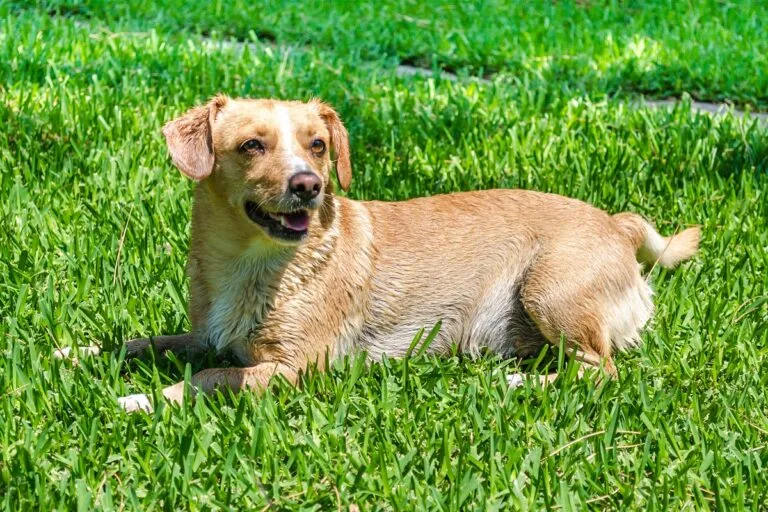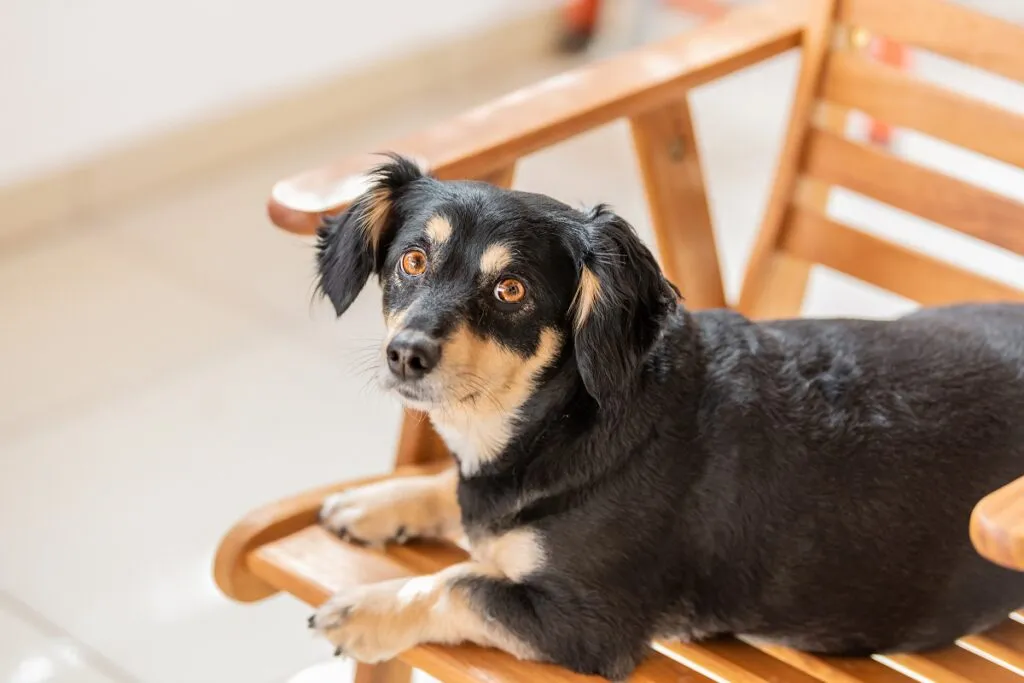Medium Size Poodle
The Kokoni is widespread in its native Greece. However, it is rarely bred professionally, and instead reproduces more or less uncontrollably on the streets. As a result, there are many Kokoni mixes and a diverse array of appearances for this small, cheerful bundle of energy.

© Nikolaos / stock.adobe.com
The products featured have been carefully selected by our editorial staff and are available at the zooplus online pet shop. The selection does not constitute advertising for the mentioned brands.
The Kokoni is among the small dog breeds. Males reach a shoulder height of 24 to 38 centimetres, while females grow to 23 to 27 centimetres. The weight of male individuals varies between five and eight kilograms, and for females, it’s between four and seven kilograms.
Typical for this little Greek is its rather elongated body. It has short, sturdy legs, a bushy-furred rod, and furry lop ears. Its head somewhat resembles that of a Dachshund. The fur comes in all colours and patterns, and it’s of medium length on the neck, nape, and torso. The back sides of the rear legs are adorned with sometimes very long hairs known as “feathers”.
The name “Kokoni” comes from Greek, translating to “small dog” or “favourite”. Internationally, the breed is also known as “Small Greek Domestic Dog”.
 © Gur / stock.adobe.com
© Gur / stock.adobe.com
The Kokoni is considered a companion dog. It has a clingy, friendly, and human-oriented nature, making it the ideal family dog. It is also a pleasant companion for singles or seniors due to its sociable nature.
In Greece, the spirited, playful Kokoni is one of the few dog breeds kept solely for pleasure – such as a playmate for children.
In addition, this dog also takes on some practical tasks around the house and yard. For example, it announces visitors with loud barking. Moreover, it hunts mice, rats and other vermin. This four-legged friend generally gets along well with cats and dutifully guards other smaller pets as well.
Although Kokonis are seen as teachable, easy to train dogs for beginners, they too require clear signals and loving consistency. A poorly trained or under-stimulated Kokoni can indeed develop into a yapper.
Kokonis develop strong bonds with their caregivers. They crave a lot of attention and therefore do not like to be left alone for long periods. Due to their small size, this breed can also be kept in a city apartment. However, the little four-legged friend should not have to climb too many stairs.
A house in the countryside, where it can keep guard, suits this dog’s tastes. The little one enjoys being outdoors and loves scampering through a securely fenced garden. Yet, just as enjoyable are lengthy walks and plenty of attention from its owners.
Because of its fondness for children, the Kokoni can be trained as a therapy or school support dog. One possible job might be as a reading dog that listens patiently to students practising their reading skills.
Active, lively dogs like the Kokoni are suitable for a wide range of dog sports. For instance, Dogdance is an option for the agile Southerner, as well as Agility, provided that the obstacles are adjusted to its size. The clever little fellow enjoys learning small tricks and can be kept busy with intelligence toys.
The medium to long coat of the Kokoni should be regularly brushed. This helps remove dirt and loose fur bolstering the bond between dog and owner.
In addition, this breed’s lop ears require a bit of attention, as they can quickly develop infections. After walks, the dog’s skin should also be checked for ticks.
Regarding nutrition, this unassuming dog isn’t particularly fussy. It is recommended to buy high-quality, grain-free food that supports the animal’s health. Barf, dry, and wet food are all suitable, though with dry food, a variety with small kibbles for small breeds should be chosen.
The Kokoni is considered a robust dog. No breed-specific hereditary diseases are known. No surprise: The breed is widespread in Greece, and the gene pool is vast. Often, the animals live (semi-)wild on the streets and reproduce uncontrollably.
Professional breeding is rare. Thus, specific features are neither selectively bred nor are the animals purposefully crossed. Most are private owners who simply pass on their puppies to friends and neighbours.
Among all Greek dog breeds, so-called Mediterranean diseases are widespread, which are infections transmitted by mosquitoes, ticks, or other parasites.
Anyone wanting to adopt a dog from Greece should definitely have it tested for Leishmaniasis, Ehrlichiosis, Babesiosis, and other Mediterranean diseases to avoid introducing them to their home country.
Like many small dog breeds, Kokonis can reach a rather high age. With proper care, they can live up to 16 years.
The Kokoni has a long history, having been kept as domestic and yard dogs since antiquity. For example, depictions of the animals can be found on ancient vases. And the famous philosopher and naturalist Aristotle is said to have reported on the popular four-legged friend.
Nonetheless, it was not until 2005 that Kokoni was officially recognised as a distinct breed in Greece. International recognition by the Fédération Cynologique Internationale (FCI) is still pending to this day. One of the reasons for this is likely the inconsistent appearance of the animals: Kokonis come in all fur colours, so they tend to look more like mixed breeds than pedigree dogs.
The Kokoni and another Greek dog breed, the Alopekis, look quite similar. Some dog enthusiasts even believe they are the same breed – with the Kokoni as the long-haired variant and the Alopekis as the short-haired representative.
Indeed, there are significant overlaps between the two breeds in terms of origin, nature, and appearance. However, only the long-haired variant, the Kokoni, is officially recognised as a dog breed at the national level in Greece.
 © Ben Brewer/Wirestock/stock.adobe.com
© Ben Brewer/Wirestock/stock.adobe.com
Outside Greece, Kokonis are hard to come by, as there are hardly any breeders of the breed. Even in Greece, it is more private owners and enthusiasts of the breed that regularly have puppies to give away.
Those interested in adopting a Kokoni should therefore look to (international) animal welfare organisations. Time and again, these organisations arrange for Kokonis and Kokoni mixes to be adopted abroad, including former stray dogs.
Dog lovers wishing to bring a Kokoni from Greece to their home should definitely turn to a reputable animal welfare organisation. Only if the dog has all necessary vaccinations and documents is it legal to enter.
A cheerful, easily trainable four-legged friend in a compact size: The Kokoni is a true dream dog that will delight families and singles alike. Those lucky enough to be able to adopt one of these dogs will find a loyal friend for life.
Here are some purchase proposals curated by the zooplus editorial team
The products featured have been carefully selected by our editorial staff and are available at the zooplus online pet shop. The selection does not constitute advertising for the mentioned brands.
| Highlights: Small, widespread dog breed from Greece. Often kept as a companion, domestic, and yard dog. |
| Character: Clingy, child-friendly, friendly, intelligent |
| Withers Height: Males 24-38 cm, Females 23-27 cm |
| Weight: Males 5-8 kg, Females 4-7 kg |
| Fur: Medium to very long in places; all colours and patterns |
| Coat Care: Moderate effort |
| Exercise: Loves walks, suitable for dog sports |
| Suitable for Beginners: Yes |
| Barking: Moderate to a lot |
| Life Expectancy: 16 years |
| Typical Diseases: Robust breed, no known hereditary diseases; however, susceptible to Mediterranean diseases such as Leishmaniasis, Ehrlichiosis, and Babesiosis | |
| Price: Up to approx. €1,000 |
| FCI Group: Not officially recognised, but is assigned to FCI Group 9 “Companion and Toy Dogs” |
| Exercise Needs: Medium |
| Origin: Greece |
Fans of the Bearded Collie agree that those who aren't familiar with this dog breed simply have to get acquainted with it. And those who have experienced how a Bearded Collie bolts across meadows with its flowing fur, how it rolls around full of energy and joy and how it attentively and observantly takes into account its owners wishes become simply addicted to this original dog breed and its unique charm.
The Goldendoodle isn't a breed, but a pairing between Golden Retrievers and Medium or Standard Poodles. Marketed as a low-maintenance dog for allergy sufferers, this hybrid is enjoying increasing popularity amongst dog lovers, similar to the Labradoodle.